The Best DVDs and Blu-rays of 2017
 Baby Driver (2017) The surprise hit of the year — no surprise, actually, if you know the work of director Edgar Wright (“Shaun of the Dead,” 2004; “Hot Fuzz,” 2007; “Scott Pilgrim vs. the World,” 2010, and “The World’s End,” 2013) and his offbeat movies that draw in diverse audiences and great reviews. Here he tells the story of Baby (Ansel Elgort), a young getaway car driver in Atlanta who drives for crime kingpin Doc (Kevin Spacey) to pay off an old debt. Suffering from tinnitus, Baby blocks the noise in his ears by constantly listening to music mixes on iPods — and although he’s absorbed with his music, he’s the best driver around. Doc never uses the same crew twice, and the current crew — consisting of trigger-happy Bats (Jamie Foxx), Buddy (Jon Hamm), an easy-going killer, and Darling (Eiza González), Buddy’s lawless girl — have little faith in Baby — or Doc. When their heist goes wrong, Baby kills Bats using his car in an unbelievable way, Darling is shot dead by the police, and Buddy goes after Baby with a vengeance. On the run from Buddy, Doc and the police, Baby’s only hope is to get of town fast with his money and his waitress girlfriend (Lily James). The beauty of the film is its no-frills dialogue, extremely fast-paced, adrenaline-pumping action, and its music — the actor’s timing (in particular Baby’s driving) and movements are synced with the killer soundtrack — that has become one of the best-selling records of the year). It’s stylish, thrilling, exciting, innovative, well-directed and acted. Not to be missed.
Baby Driver (2017) The surprise hit of the year — no surprise, actually, if you know the work of director Edgar Wright (“Shaun of the Dead,” 2004; “Hot Fuzz,” 2007; “Scott Pilgrim vs. the World,” 2010, and “The World’s End,” 2013) and his offbeat movies that draw in diverse audiences and great reviews. Here he tells the story of Baby (Ansel Elgort), a young getaway car driver in Atlanta who drives for crime kingpin Doc (Kevin Spacey) to pay off an old debt. Suffering from tinnitus, Baby blocks the noise in his ears by constantly listening to music mixes on iPods — and although he’s absorbed with his music, he’s the best driver around. Doc never uses the same crew twice, and the current crew — consisting of trigger-happy Bats (Jamie Foxx), Buddy (Jon Hamm), an easy-going killer, and Darling (Eiza González), Buddy’s lawless girl — have little faith in Baby — or Doc. When their heist goes wrong, Baby kills Bats using his car in an unbelievable way, Darling is shot dead by the police, and Buddy goes after Baby with a vengeance. On the run from Buddy, Doc and the police, Baby’s only hope is to get of town fast with his money and his waitress girlfriend (Lily James). The beauty of the film is its no-frills dialogue, extremely fast-paced, adrenaline-pumping action, and its music — the actor’s timing (in particular Baby’s driving) and movements are synced with the killer soundtrack — that has become one of the best-selling records of the year). It’s stylish, thrilling, exciting, innovative, well-directed and acted. Not to be missed.
Get Out (2016) A sophisticated, culturally aware horror thriller that takes race relations to a new level. Director Jordan Peele (half of “Key and Peele”) takes a normal, white upper-class family and turns them into monsters in the most unexpected way. Now that Chris (Daniel Kaluuya) and his girlfriend, Rose (Allison Williams), have reached the meet-the-parents milestone of dating, she invites him for a weekend getaway in the country with parents Missy (Catherine Keener) and Dean (Bradley Whitford). At first, Chris reads the family’s overly accommodating behavior as nervous attempts to deal with their daughter’s interracial relationship, but as the weekend progresses, a series of increasingly disturbing discoveries lead him to a truth that he could have never imagined. Without spoiling any of the amazing revelations of the film, suffice it to say that “Get Out” (which doubles as the “Get Out” of slang for astonishment and the “Get Out” command to head for safety) is kinda like “Invasion of the Body Snatchers” meets “White Zombie” (1932). Just remember that the monsters are us.
 Glory (2016 — Bulgaria) Tsanko Petrov, a railroad worker, finds millions of leva on the train tracks. He decides to turn the money over to the police, for which the state rewards him with a new wristwatch that soon stops working. Meanwhile, Julia Staikova, head of the PR department of the Ministry of Transport, loses Petrov’s old watch, a family relic. Here starts his desperate struggle to recover both his old watch and his dignity. From Bulgarian Bulgarian filmmakers Kristina Grozeva and Petar Valchanov, who brought to the big screen 2014’s “The Lesson.”
Glory (2016 — Bulgaria) Tsanko Petrov, a railroad worker, finds millions of leva on the train tracks. He decides to turn the money over to the police, for which the state rewards him with a new wristwatch that soon stops working. Meanwhile, Julia Staikova, head of the PR department of the Ministry of Transport, loses Petrov’s old watch, a family relic. Here starts his desperate struggle to recover both his old watch and his dignity. From Bulgarian Bulgarian filmmakers Kristina Grozeva and Petar Valchanov, who brought to the big screen 2014’s “The Lesson.”
The Handmaiden (2016 — South Korea) From Park Chan-wook, the celebrated director of “Oldboy,” “Lady Vengeance,” “Thirst” and “Stoker” comes a ravishing new crime drama inspired by the novel “Fingersmith” by British author Sarah Waters. Having transposed the story to 1930s-era colonial Korea and Japan, Park presents a gripping and sensual tale of a young Japanese Lady living on a secluded estate, and a Korean woman — a street thief –who is hired to serve as her new handmaiden, but who is secretly involved in a conman’s plot to defraud her of her large inheritance. Powered by remarkable performances from Kim Min-hee as Lady Hideko, Ha Jung-woo as the con-man who calls himself the Count and sensational debut actress Tae-ri Kim as the maid Sookee, the film borrows the most dynamic elements of its source material and combines it with Park’s singular vision and energy to create an unforgettable viewing experience. One of New York Times’ Best Films of 2016 and Certified Fresh (93%) on Rotten Tomatoes.
 Jacques Rivette Collection Limited Edition In 1975, Jacques Rivette reunited with “Out” 1 producer Stéphane Tchal Gadjieff with the idea of a four-film cycle. He would create a quartet of interconnected films, each in a different genre. One was to be a love story, another a Western, and there was to be a fantastical thriller and a musical comedy starring Anna Karina and Jean Marais too. Ill health intervened, and only two of the films were completed. “Duelle (une quarantine)” (1976) sees Rivette in fantasy territory, cross-pollinating Val Lewton, Jean Cocteau and film noir as the Queen of the Sun (Bulle Ogier) and the Queen of the Night (Juliet Berto) search for a magical diamond in present day. Its parallel film, “Noroît (une vengeance)” (1976), is a pirate tale — and a loose adaptation of “The Revenger’s Tragedy” — starring Geraldine Chaplin (“Nashville”). A third film began production — “Marie et Julien” starring Albert Finney and Leslie Caron — but Rivette succumbed to nervous exhaustion and shooting was abandoned. When he did return to filmmaking, Rivette borrowed some of the elements of “Duelle” and “Noroît” and came up with” Merry-Go-Round” (1981). Joe Dallesandro (“Trash,” “Flesh for Frankenstein”) and Maria Schneider (“Last Tango in Paris,” “The Passenger”) are summoned to Paris, which leads to one of the most surreal and mysterious tales in a career that was dominated by surrealism and mystery.
Jacques Rivette Collection Limited Edition In 1975, Jacques Rivette reunited with “Out” 1 producer Stéphane Tchal Gadjieff with the idea of a four-film cycle. He would create a quartet of interconnected films, each in a different genre. One was to be a love story, another a Western, and there was to be a fantastical thriller and a musical comedy starring Anna Karina and Jean Marais too. Ill health intervened, and only two of the films were completed. “Duelle (une quarantine)” (1976) sees Rivette in fantasy territory, cross-pollinating Val Lewton, Jean Cocteau and film noir as the Queen of the Sun (Bulle Ogier) and the Queen of the Night (Juliet Berto) search for a magical diamond in present day. Its parallel film, “Noroît (une vengeance)” (1976), is a pirate tale — and a loose adaptation of “The Revenger’s Tragedy” — starring Geraldine Chaplin (“Nashville”). A third film began production — “Marie et Julien” starring Albert Finney and Leslie Caron — but Rivette succumbed to nervous exhaustion and shooting was abandoned. When he did return to filmmaking, Rivette borrowed some of the elements of “Duelle” and “Noroît” and came up with” Merry-Go-Round” (1981). Joe Dallesandro (“Trash,” “Flesh for Frankenstein”) and Maria Schneider (“Last Tango in Paris,” “The Passenger”) are summoned to Paris, which leads to one of the most surreal and mysterious tales in a career that was dominated by surrealism and mystery.
Manchester by the Sea (2016) In the latest film from award-winning writer and director Kenneth Lonergan, the life of a solitary Boston janitor is transformed when he returns to his hometown to take care of his teenage nephew. The story of the Chandlers, a working-class family living in a Massachusetts fishing village for generations, “Manchester by the Sea” is a deeply poignant, unexpectedly funny exploration of the power of familial love, community, sacrifice and hope. After the death of his older brother Joe (Kyle Chandler), Lee Chandler (Casey Affleck) is shocked to learn that Joe has made him sole guardian of his nephew Patrick (Lucas Hedges). Taking leave of his job, Lee reluctantly returns to Manchester-by-the-Sea to care for Patrick, a spirited 15-year-old, and is forced to deal with a tragic past that separated him from his wife Randi (Michelle Williams) and the community where he was born and raised. It’s a journey of love, community, sacrifice, and hope.
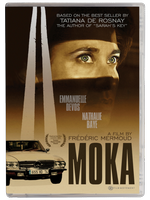 Moka (2016 — France) A grieving woman pursues a couple whom she suspects of killing her son in a hit-and-run in this moody, riveting psychological thriller. Adapted from Tatiana de Rosnay’s bestselling novel, “Moka”, winner of the prestigious Variety Piazza Grande Award at last year’s Locarno International Film Festival, follows Diane Kramer (Emmanuelle Devos), who travels to Évian in search of the mocha-colored Mercedes that she believes killed her son. Overwhelmed with grief and desperate for answers, she tracks down Marlene (Nathalie Baye), a beauty salon proprietor and owner of the vehicle. In order to get closer to her, Diane pretends to be a potential buyer for the car, but the path of revenge is far more tortuous and complicated than it seems.
Moka (2016 — France) A grieving woman pursues a couple whom she suspects of killing her son in a hit-and-run in this moody, riveting psychological thriller. Adapted from Tatiana de Rosnay’s bestselling novel, “Moka”, winner of the prestigious Variety Piazza Grande Award at last year’s Locarno International Film Festival, follows Diane Kramer (Emmanuelle Devos), who travels to Évian in search of the mocha-colored Mercedes that she believes killed her son. Overwhelmed with grief and desperate for answers, she tracks down Marlene (Nathalie Baye), a beauty salon proprietor and owner of the vehicle. In order to get closer to her, Diane pretends to be a potential buyer for the car, but the path of revenge is far more tortuous and complicated than it seems.
mother! (2017) A couple’s relationship is tested when uninvited guests arrive at their home, disrupting their tranquil existence. An allegorical couple — a young woman with her husband at their country home — has their life disrupted by the arrival of a mysterious man and woman. A series of disturbing events follow, turning their idyllic home into a hellish nightmare. From filmmaker Darren Aronofsky (“Black Swan,” “Requiem for a Dream”), comes this riveting psychological thriller about love, devotion and sacrifice. Stars Jennifer Lawrence, Javier Bardem, Ed Harris, Michelle Pfeiffer, Domhnall Gleeson, Brian Gleeson, Jovan Adepo.
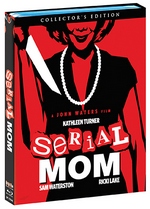 Serial Mom Collector’s Edition (1994) Kathleen Turner, Sam Waterston, Ricki Lake, Mink Stole, Patricia Hearst, Matthew Lillard, Mary Jo Catlett, Traci Lords, Suzanne Somers. If you are ill-mannered, have a poor sense of social etiquette or just plain irresponsible, then beware of the cheerfully psychotic housewife Beverly Sutphin from John Waters’ wickedly hilarious cult classic. In a Blu-ray debut.
Serial Mom Collector’s Edition (1994) Kathleen Turner, Sam Waterston, Ricki Lake, Mink Stole, Patricia Hearst, Matthew Lillard, Mary Jo Catlett, Traci Lords, Suzanne Somers. If you are ill-mannered, have a poor sense of social etiquette or just plain irresponsible, then beware of the cheerfully psychotic housewife Beverly Sutphin from John Waters’ wickedly hilarious cult classic. In a Blu-ray debut.
Train to Busan (2016 — South Korea) Zombie horror-thriller that follows a group of terrified passengers fighting their way through a countrywide zombie viral outbreak, trapped on a suspicion-filled, blood-drenched bullet-train ride to the Safe Zone … which may or may not still be there. A businessman and his estranged daughter hop a train to Busan, unawares that a research plant — funded by the businessman’s financia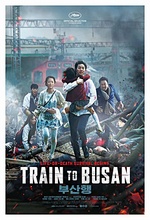 l firm — has unleashed a virus that is quickly turning South Korea into a land of zombies. When the infection spreads to the speeding train, a group of passengers — lead by the businessman and a blue-collar worker — must fight their way through the zombie hordes to the safety of the front cars of the train — all the while hoping that Busan has been safely cordoned off from the infected countryside. It’s a thrilling, entertaining take on the zombie genre, with fleshed out characters, social commentary, and terrific action sequences. Forget all you knew about slow-moving zombies — these flesh eaters, like the ones in “World War Z,” are pretty darn fast and hard to stop. Biggest grossing South Korean film of all time.
l firm — has unleashed a virus that is quickly turning South Korea into a land of zombies. When the infection spreads to the speeding train, a group of passengers — lead by the businessman and a blue-collar worker — must fight their way through the zombie hordes to the safety of the front cars of the train — all the while hoping that Busan has been safely cordoned off from the infected countryside. It’s a thrilling, entertaining take on the zombie genre, with fleshed out characters, social commentary, and terrific action sequences. Forget all you knew about slow-moving zombies — these flesh eaters, like the ones in “World War Z,” are pretty darn fast and hard to stop. Biggest grossing South Korean film of all time.
And don’t forget the following Criterion releases:
Barry Lyndon (1975) Stanley Kubrick bent the conventions of the historical drama to his own will in this dazzling vision of brutal aristocracy, adapted from a novel by William Makepeace Thackeray. In picaresque detail, “Barry Lyndon” chronicles the adventures of an incorrigible trickster (Ryan O’Neal) whose opportunism takes him from an Irish farm to the battlefields of the Seven Years’ War and the parlors of high society. For the most sumptuously crafted film of his career, Kubrick recreated the decadent surfaces and intricate social codes of the period, evoking the light and texture of 18-century painting with the help of pioneering cinematographic techniques and lavish costume and production design, all of which earned Academy Awards. The result is a masterpiece — a sardonic, devastating portrait of a vanishing world whose opulence conceals the moral vacancy at its heart.
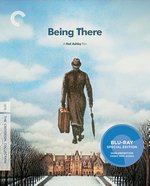 Being There (1979) In one of his most finely tuned performances, Peter Sellers plays the pure-hearted Chance, a gardener forced out of moneyed seclusion and into the urban wilds of Washington, D.C., after the death of his employer. Shocked to discover that the real world doesn’t respond to the click of a remote, Chance stumbles haplessly into celebrity after being taken under the wing of a tycoon (Melvyn Douglas), who mistakes his new protégé’s mumbling about horticulture for sagacious pronouncements on life and politics, and whose wife targets Chance as the object of her desire. Adapted from a novel by Jerzy Kosinski, this hilarious, deeply melancholy satire marks the culmination a remarkable string of films by Hal Ashby in the 1970s, and serves as a carefully modulated examination of the ideals, anxieties, and media-fueled delusions that shaped American culture during that decade.
Being There (1979) In one of his most finely tuned performances, Peter Sellers plays the pure-hearted Chance, a gardener forced out of moneyed seclusion and into the urban wilds of Washington, D.C., after the death of his employer. Shocked to discover that the real world doesn’t respond to the click of a remote, Chance stumbles haplessly into celebrity after being taken under the wing of a tycoon (Melvyn Douglas), who mistakes his new protégé’s mumbling about horticulture for sagacious pronouncements on life and politics, and whose wife targets Chance as the object of her desire. Adapted from a novel by Jerzy Kosinski, this hilarious, deeply melancholy satire marks the culmination a remarkable string of films by Hal Ashby in the 1970s, and serves as a carefully modulated examination of the ideals, anxieties, and media-fueled delusions that shaped American culture during that decade.
Desert Hearts (1985) Donna Deitch’s swooning and sensual first narrative feature, “Desert Hearts,” was groundbreaking upon its 1985 release: A love story about two women, made entirely independently, on a self-financed shoestring budget, by a woman. In the 1959-set film, an adaptation of a novel by Jane Rule, straitlaced East Coast professor Vivian Bell (Helen Shaver) arrives in Reno to file for divorce but winds up catching the eye of someone new, the younger free spirit Cay (Patricia Charbonneau), touching off a slow seduction that unfolds against a breathtaking desert landscape. With undeniable chemistry between its two leads, an evocative jukebox soundtrack, and vivid cinematography by Robert Elswit, “Desert Hearts” beautifully exudes a sense of tender yearning and emotional candor.
Election (1999) Perky, overachieving Tracy Flick (Reese Witherspoon) gets on the nerves of history teacher Jim McAllister (Matthew Broderick) to begin with, but after she launches her campaign for high-school president and his personal life starts to fall apart, things spiral out of control. In Alexander Payne’s satire “Election,” the teacher comes unhealthily obsessed with cutting his student down to size, covertly backing a spoiler candidate to stop her from steamrolling to victory, and putting in motion a series of dirty tricks and reckless promises with uncanny real-world political parallels. Adapting a then-unpublished novel by Tom Perrotta, Payne grounds the absurdity of his central dynamic in the recognizable — the setting is his hometown of Omaha, and the accomplished cast is rounded out with nonprofessionals — and distills his closely observed take on deeply flawed humanity to its bitter but stealthily sympathetic essence.
 Fox and His Friends (1975c– Germany) A lottery win leads not to financial and emotional freedom but to social captivity in this wildly cynical classic about love and exploitation by Rainer Werner Fassbinder. Casting himself against type, the director plays a suggestible working-class innocent who lets himself be taken advantage of by his bourgeois new boyfriend (Peter Chatel) and his circle of materialistic friends, leading to the kind of resonant misery that only Fassbinder could create. “Fox and His Friends” is unsparing social commentary, an amusingly pitiless and groundbreaking if controversial depiction of a gay community in 1970s West Germany.
Fox and His Friends (1975c– Germany) A lottery win leads not to financial and emotional freedom but to social captivity in this wildly cynical classic about love and exploitation by Rainer Werner Fassbinder. Casting himself against type, the director plays a suggestible working-class innocent who lets himself be taken advantage of by his bourgeois new boyfriend (Peter Chatel) and his circle of materialistic friends, leading to the kind of resonant misery that only Fassbinder could create. “Fox and His Friends” is unsparing social commentary, an amusingly pitiless and groundbreaking if controversial depiction of a gay community in 1970s West Germany.
Ghost World (2001) Terry Zwigoff’s first fiction film, adapted from a cult-classic comic by Daniel Clowes, is an idiosyncratic portrait of adolescent alienation that’s at once bleakly comic and wholly endearing. Set during the malaise-filled months following high-school graduation, “Ghost World” follows the proud misfit Enid (Thora Birch), who confronts an uncertain future amid the cultural wasteland of consumerist suburbia. As her cynicism becomes too much to bear even for her best friend, Rebecca (Scarlett Johansson), Enid finds herself drawn to an unlikely kindred spirit: a sad-sack record collector many years her senior (Steve Buscemi). With its parade of oddball characters, quotable, Oscar-nominated script, and eclectic soundtrack of vintage obscurities,
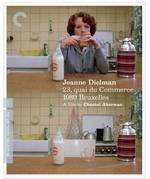 Jeanne Dielman, 23, Quai Du Commerce, 1080 Bruxelles (1975 — Belgium) A singular work in film history, Chantal Akerman’s “Jeanne Dielman, 23, quai du Commerce, 1080 Bruxelles” meticulously details, with a sense of impending doom, the daily routine of a middle-aged widow (Delphine Seyrig) — whose chores include making the beds, cooking dinner for her son, and turning the occasional trick. In its enormous spareness, Akerman’s film seems simple, but it encompasses an entire world. Whether seen as an exacting character study or one of cinema’s most hypnotic and complete depictions of space and time, Jeanne Dielman is an astonishing, compelling movie experiment, one that has been analyzed and argued over for decades.
Jeanne Dielman, 23, Quai Du Commerce, 1080 Bruxelles (1975 — Belgium) A singular work in film history, Chantal Akerman’s “Jeanne Dielman, 23, quai du Commerce, 1080 Bruxelles” meticulously details, with a sense of impending doom, the daily routine of a middle-aged widow (Delphine Seyrig) — whose chores include making the beds, cooking dinner for her son, and turning the occasional trick. In its enormous spareness, Akerman’s film seems simple, but it encompasses an entire world. Whether seen as an exacting character study or one of cinema’s most hypnotic and complete depictions of space and time, Jeanne Dielman is an astonishing, compelling movie experiment, one that has been analyzed and argued over for decades.
Stalker (1979 — USSR) Andrei Tarkovsky’s final Soviet feature is a metaphysical journey through an enigmatic postapocalyptic landscape, and a rarefied cinematic experience like no other. A hired guide—the Stalker—leads a writer and a scientist into the heart of the Zone, the restricted site of a long-ago disaster, where the three men eventually zero in on the Room, a place rumored to fulfill one’s most deeply held desires. Adapting a science-fiction novel by Arkady and Boris Strugatsky, Tarkovsky created an immersive world with a wealth of material detail and a sense of organic atmosphere. A religious allegory, a reflection of contemporaneous political anxieties, a meditation on film itself—Stalker envelops the viewer by opening up a multitude of possible meanings.
The Umbrellas of Cherbourg (1964 — France) An angelically beautiful Catherine Deneuve was launched into stardom by this glorious musical heart-tugger from Jacques Demy. She plays an umbrella-shop owner’s delicate daughter, glowing with first love for a handsome garage mechanic, played by Nino Castelnuovo. When the boy is shipped off to fight in Algeria, the two lovers must grow up quickly. Exquisitely designed in a kaleidoscope of colors, and told entirely through the lilting songs of the great composer Michel Legrand, “The Umbrellas of Cherbourg” is one of the most revered and unorthodox movie musicals of all time.
The Best DVDs and Blu-rays of 2011
The Best DVDs and Blu-rays of 2012
The Best DVDs and Blu-rays of 2013
The Best DVDs and Blu-rays of 2014



tlyz28
k20p6a